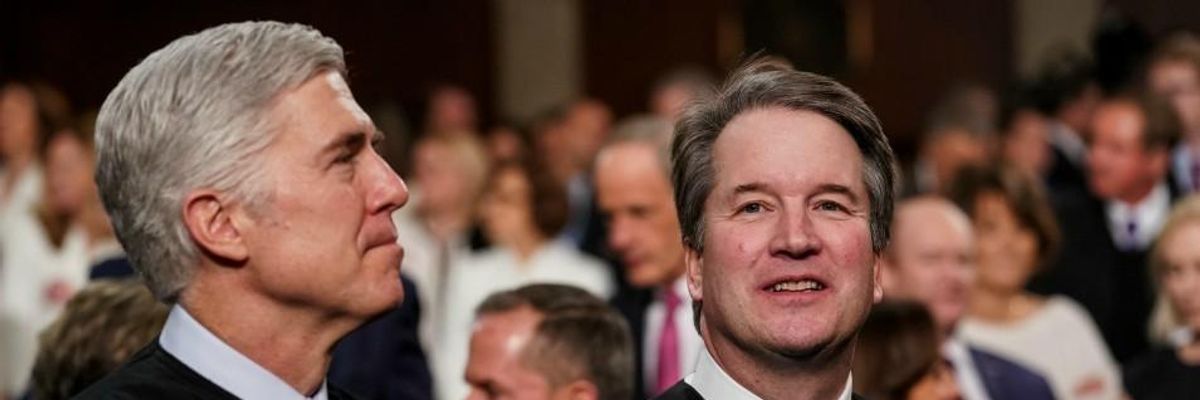The Supreme Court's conservative majority has developed a love/hate relationship with Donald Trump. Simply put, the majority loves the disgraced ex-President's social and political agenda, but hates his inflated claims of executive authority and personal grievance.
The just-announced retirement of Justice Stephen Breyer will do nothing to alter this dynamic or change the court's balance of power, no matter who succeeds Breyer.
Trump's most recent personal setback before the high court came in the case of Trump v. Thompson, decided on January 19. By an 8-1 margin, with only Clarence Thomas dissenting, the court rejected Trump's request to block the release of a trove of White House documents sought by the House select committee investigating the January 6 insurrection at the U.S. Capitol.
The committee, chaired by Representative Bennie Thompson, Democrat of Massachusetts, requested the documents from the National Archives (where they have been stored pursuant to the Presidential Records Act following Trump's departure from the Oval Office). The documents concern Trump's actions on January 6 and his possible role in the insurrection. They include such items as memos, emails, diaries, schedules, and visitor and call logs--all of which Trump has sought to keep secret.
Conservative lawyer George Conway, writing in The Washington Post, calls the court's decision "a brutal and personally stinging loss for Trump. And the arguments his own lawyers advanced may have made the defeat worse."
Trump's attorneys argued that even though Trump is no longer President, he retains the right to invoke executive privilege to prevent the disclosure of documents created while he was in office. After losing in the Court of Appeals for the District of Columbia, the lawyers asked the Supreme Court to step in, undeterred by President Joe Biden's decision as the incumbent President to waive the privilege for most of the documents at issue.
The Supreme Court rebuffed Trump's claims without hearing oral arguments in an unsigned one-paragraph per curiam ("by the court") order. Trump's contentions were so weak that the court apparently saw no need for an extended discussion. Instead, it simply endorsed the conclusion of the Court of Appeals, which had held that Trump's claims "would have failed even if he were the incumbent," and that "his status as a former President necessarily made no difference to the court's decision."
Within hours of the Supreme Court's ruling, the National Archives began turning over documents to the select committee. Although the committee has not yet released the files, Politico reported that they include a draft executive order that, if issued, would have directed the Defense Department to seize voting machines across the country because of "international and foreign interference in the November 3, 2020, election." The order also called for the appointment of a special counsel to "oversee the operation."
The Thompson ruling wasn't the first time Trump's hubris resulted in embarrassment before the nation's highest tribunal. In 2020, he lost his claims of "absolute immunity" from state criminal investigations in Trump v. Vance. And last year, the court turned away the last of the Trump campaign's challenges to the results of the presidential election.
Going forward, Thompson will make it much more difficult for anyone to obstruct the committee's work with meritless defenses of executive privilege. Steve Bannon, Mark Meadows, Ivanka Trump, and their confederates and cohorts had best take heed.
But Trump's loss by no means signals a general turnaround in the direction of the Supreme Court. The six conservatives who now control the court remain committed to the legal philosophy of "originalism," as popularized by the late Justice Antonin Scalia. It asserts that the answers to contemporary questions about such matters as voting rights, gerrymandering, union organizing, the death penalty, and campaign finance are to be found solely in the supposed "original" meaning Founding Fathers intended when writing the Constitution in the late eighteenth century.
This court session promises more of the same. If anything, the court is likely to veer even more sharply to the right. Thus far, the panel has refused to block Texas's draconian new abortion law, and has invalidated the Biden Administration's COVID-19 "vaccination-or-testing" requirement for the employees of large corporations.
Before the court's current term concludes, the conservative majority will hand down opinions that likely will overturn or gut Roe v. Wade (Dobbs v. Jackson Women's Health Organization), weaken local and state gun-control measures (New York State Rifle & Pistol Association, Inc. v. Bruen), potentially cripple the Environmental Protection Act (West Virginia v. EPA), and do away with what remains of race-based affirmative action programs at colleges and universities (Students for Fair Admissions v. Harvard University and Students for Fair Admissions v. University of North Carolina).
Trump lost in Thompson, as he did in Vance and in the election conspiracy challenges filed on his behalf. But it is not because the Supreme Court has suddenly gone squishy liberal, but because his positions were so extreme no rational court could accept them.
Trump ran for office on the promise of remaking the Supreme Court and the lower federal bench. Sadly, he made good on that promise, placing three young and doctrinaire judicial activists on the court. Even allowing for the occasional blip like Thompson, the Supreme Court has delivered for Trump and will continue to do so--to poach one of his own catch phrases--"like never before."
